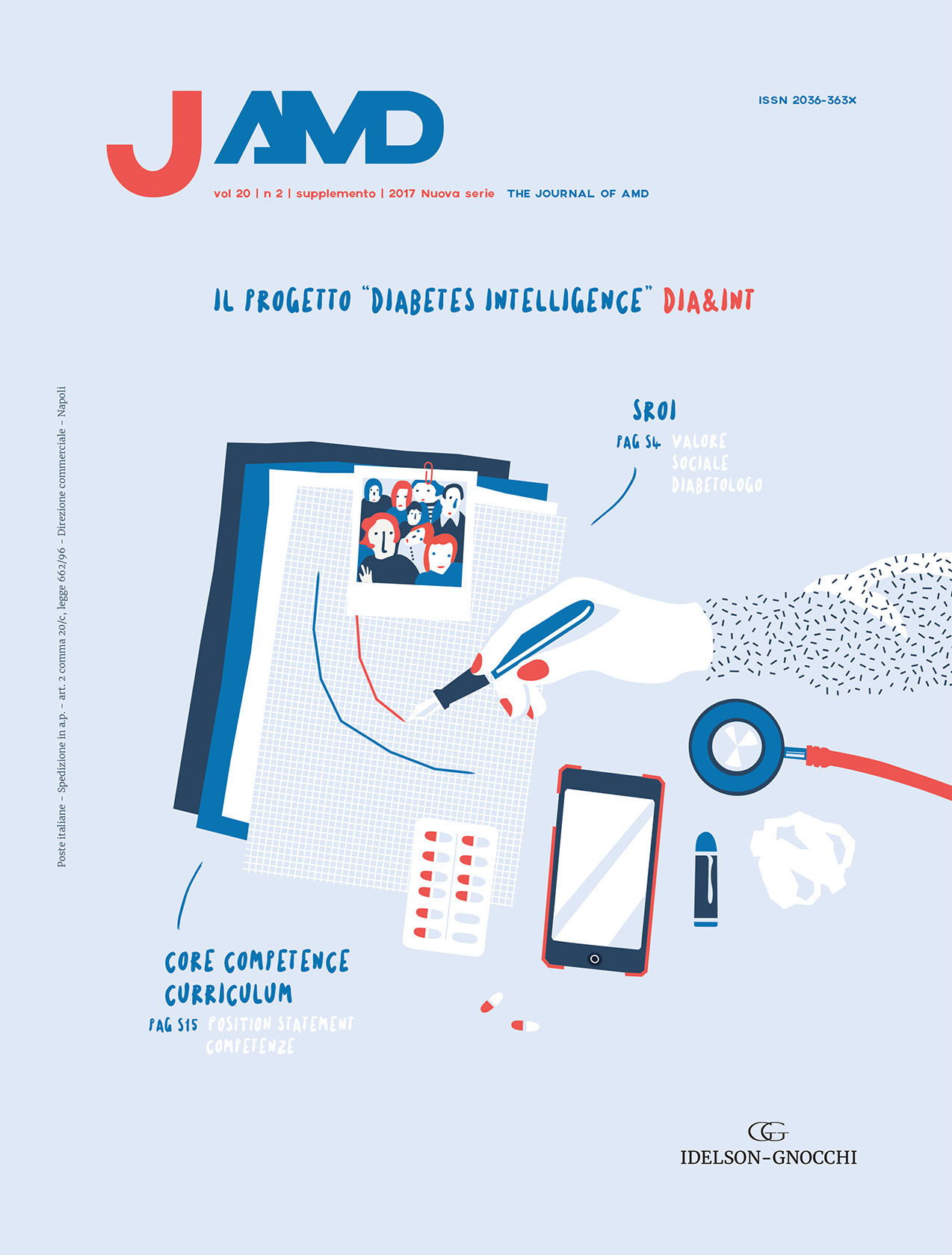IL PROGETTO DIABETES INTELLIGENCE (DIA&INT)
The Social Return Of Investment (SROI) applied to diabetology: the AMD project to enhance the diabetologist’s skills
JAMD 2017;20(S1):S4-S14
BACKGROUND AMD (Associazione Medici Diabetologi), seeing the uncontrolled growth of diabetic pandemic, has decided to launch a project called Diabetes Intelligence (DIA&INT) aimed to identify priority activities of a modern diabetology and support as well the creation of new care models that effectively address multi-chronicity.
METHOD OF ANALYSIS We chose the analysis model SROI (Social Return On Investment), a framework that helps to explore an organisations’ impact. SROI is an outcomes-based measurement tool that helps organisations to assess and communicate the social value they create through their activities and investments. The SROI method have been considered particularly suitable for our analysis because of its ability to derive the value of a diabetes care task in consideration of the outcomes it is able to positively influence.
RESULTS The first 4 places in the ranking of the Outcomes are: ‘Optimization of metabolic control –Customization of treatment goals’, ‘Reduce incidence of chronic complications’, ‘Increase in active participation/adherence to treatment by the person with diabetes’ and ‘Increased skills and strategies to treat diabetes’.
The first 4 places in the Activity ranking are: ‘Ensuring the Educational Therapy activities as an integral part of the care plan’, ‘Define and manage a customized treatment plan’, ‘Ensure specialized diagnostic classification and biomedical evaluation’ and ‘Assess patient fragility’.
These results confirm literature data that point out, in chronic diseases, the need to satisfy, simultaneously, the ‘disease needs’ and the ‘person’ needs’.
CONCLUSIONS AND DISCUSSION The SROI analysis for diabetes has allowed us to create a tool that, in our opinion, will facilitate the dialogue between two different – but tightly connected – worlds: that of the service providers (diabetologists) and that of the payer (institutions), which have different emphases and priorities, given the different nature of their roles.
The SROI model we have created is based on qualitative objectives (task priority). The next target of DIA&INT will be to see how our model is also able to drive a more comprehensive measurement of costs / benefits (with financial type proxy).
KEYWORDS Skills, Value, Outcome, Activities, Diabetology, Specifity.
Diabetologist Core Competence Curriculum: AMD Position Statement
JAMD 2017;20(S1):S15-S32
BACKGROUND The chronicity management requires to ensure not only the technological and therapeutic innovation, but also a medicine that is integrated and patient-centered as clearly explained in all the chronic management models, Chronic Care Model (CCM) and others.
For this reason the Associazione Medici Diabetologi (AMD) believes that a review of the knowledge and skills of the specialist in diabetes care is necessary to ensure the appropriate expertise/competence to the needs of a modern diabetology. AMD has decided to take action with the project called Diabetes Intelligence (DIA & INT), whose goal is to identify the knowledge, skills and priority activities in a diabetology moving with the times to create a core competence curriculum (CCC) in diabetes care that can effectively promote the implementation of the CCM.Peculiarities of this CCC is the rigorous scientific method to obtain information and the correlation between assets/knowledge/skills and the impact that they produce on the outcomes in diabetes care. This report was created through the social impact assessment (SROI: Social Return of Investment) of the activities carried out in the treatment of diabetes according to the logic of the CCM.
ANALYSIS METHOD The method used to create the CCC of diabetologist has provided the following steps:
- The identification of the activities necessary for a modern diabetology, which reflect the CCM guidelines. From guidelines,nationally recognized, we were obtained 25 reference assets.
- The identification of the Outcome required to diabetology: we were obtained 19 outcomes consistent with the CCM guidelines.
- The determination for each of the above activities, of the degree of specificity (ie: how much the diabetes specialist skills to perform them are indispensable), carried out through questionnaires completed through the web (CAWI) where AMD specialists in diabetes care have indicated their ratings. It was built a ranking of specificity.
- The impact assessment of each of the diabetes care activities on Outcome (realized through CAWI), to see how each of the activities can facilitate the implementation of the CCM. The calculations have been performed according to the algorithm of the SROI, which have emphasized the influence of each of the 25 activities compared to 19 outcome in diabetes care.
- The identification, for each of the 25 activities,of knowledge and skills as suggested by the “Standard italiani per la cura del diabete”, which are the Italian guideline for diabetes care.
- The indication, for each of the 25 activity, of the degree of specificity and priority (priority evaluated according to what the activity can facilitate the implementation of the CCM).
The different steps have been developed following a strict criteria of validation, as follows:
- The identification of the core activities of our CCC was conducted by a group of experts who had previously participated in the drafting of the guidelines. They provided for each of the identified activities the related references.
- Outcomes were identified taking as a reference the Piano Nazionale del Diabete and the Manifesto dei Pazienti (which are official documents recognized by the Ministry of Health).
- The CCC has been approved by Consiglio Direttivo Nazionale AMD which is the governing body of our Association.
RESULTS The main objective of this work was the creation of a CCC of the specialist in diabetes care with this unique characteristic: it is concretely linked to the CCM, listing activities consistent with this model, and associating, for each activity, the following information:
- knowledge and skills needed;
- priority in facilitating the implementation of the CCM (ie, degree of influence of the activities on the outcome in diabetes care);
- degree of specificity.
In order to associate the above information, the CCC includes two other results of DIA & INT project:
- The specificity ranking of activities in diabetes care;
- The priority ranking in diabetes care activities (ie, the ranking built according to the degree of influence of the activities in relation to the CCM).
CONCLUSIONS The result of this project is represented by the CC of the specialist in diabetes care approved as position statement from AMD.
KEYWORDS Diabetologist Core Competence Curriculum, Knowledge, Skills, Activities, Diabetologist, Specificity, CCM (Chronic Care Model), SROI (Social Return Of Investment).
Introduction
For a specificity of our specialty
JAMD 2017;20(S1):S2-S3




